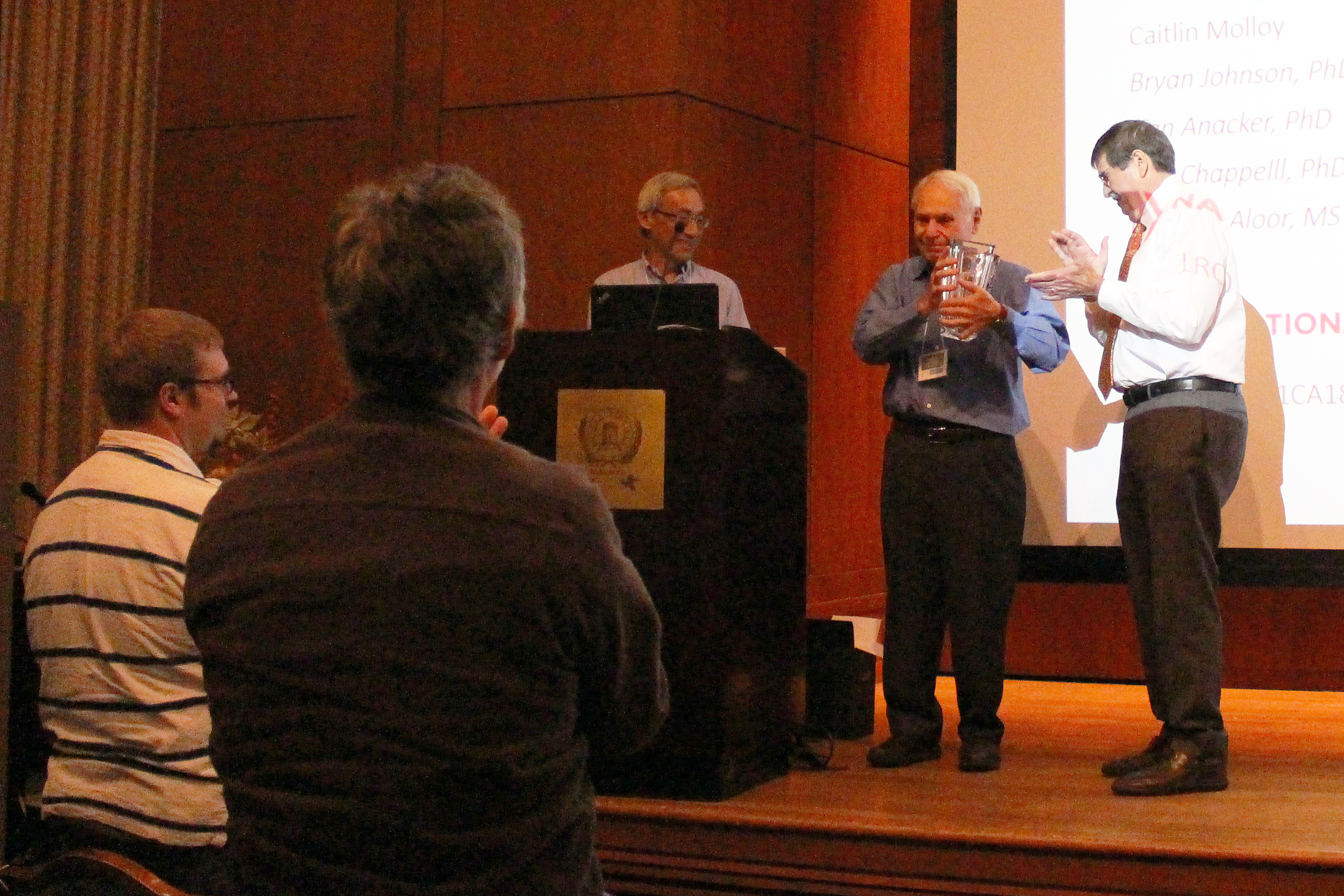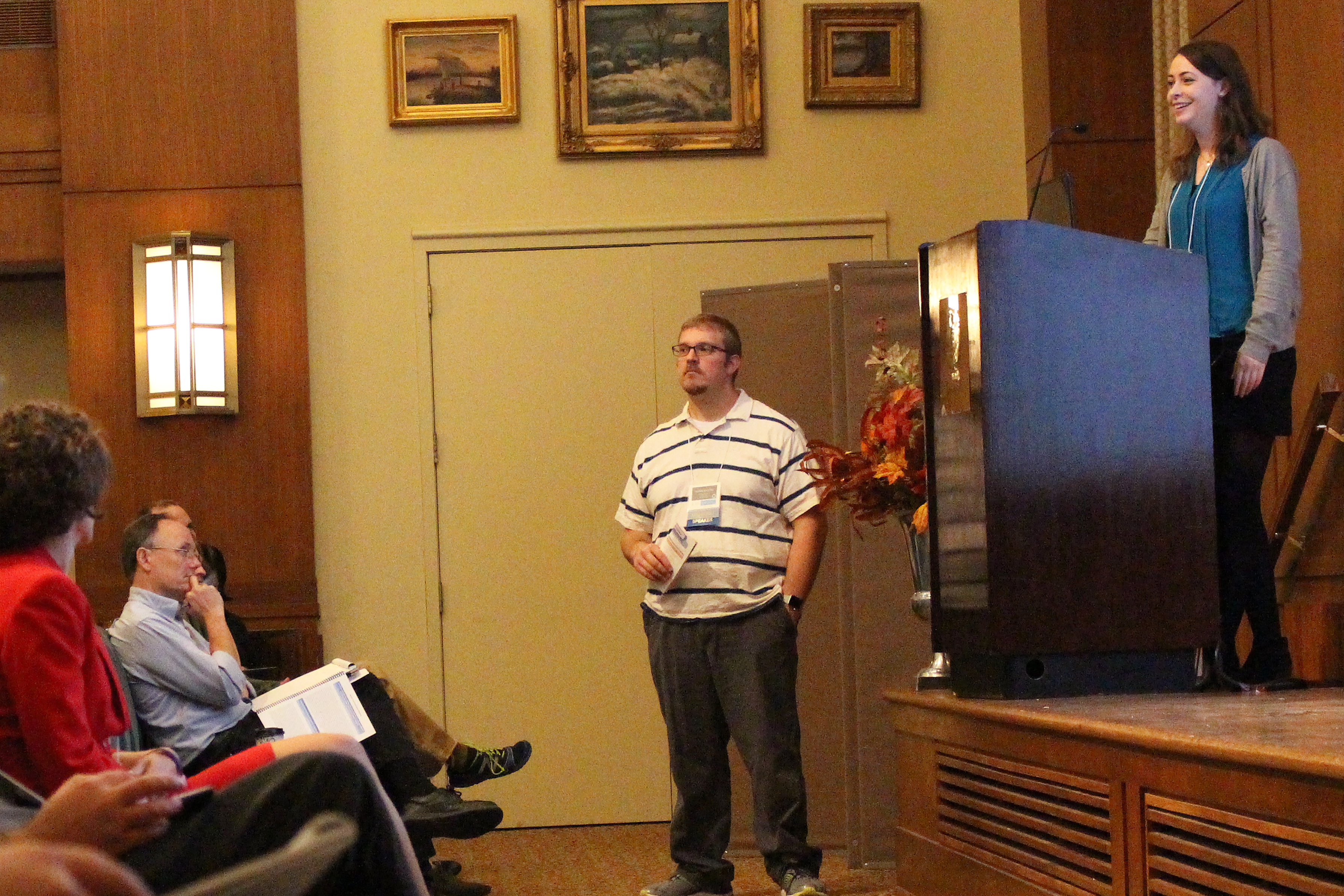

UNC Lineberger Comprehensive Cancer Center Director Emeritus Joseph Pagano, MD, was honored at the 42nd Annual Postdoc-Faculty Research Day on Tuesday for providing more than four decades of leadership of UNC Lineberger’s postdoctoral training program.
The event, an annual showcase of the research by the center’s postdoctoral trainees, drew approximately 180 trainees, graduate students, faculty and staff to The Carolina Club on Oct. 3. Pagano, Lineberger Professor of Cancer Research, founded the center’s training program in 1975 and has served as its director for 42 years.
He is now passing the baton for the postdoctoral program leadership to Channing Der, PhD, UNC Lineberger member and the Sarah Graham Kenan Distinguished Professor in the UNC School of Medicine. On Tuesday, Der and UNC Lineberger Interim Director Shelton “Shelley” Earp, MD, presented Pagano with an engraved crystal vase to recognize his contributions.
“Joe also recruited me to UNC, so I have him to thank for the opportunity to be here,” Der said. “Forty-two years is quite an incredible accomplishment. He leaves quite a legacy for this training grant. I hope I can continue the excellence of this (program).”
Pagano started the program at a time when UNC-Chapel Hill was “off the beaten path,” Earp said, and the training grant was small. Pagano grew the program over time to become one of the largest in the country. The trainees are important to the center’s work, Earp said, praising the translational nature of the center’s current postdoctoral trainees.
“He has had an amazing effect on this place,” Earp said of Pagano. “He recruited me, and virtually everybody in this room who’s on the faculty … we’d like to thank Joe for what’s he’s done.”
Pagano said he started the program at a time when there was little recognition for postdoctoral trainees. He said trainees are “integral” to cancer research, and he is proud of the program’s growth.
Looking toward the future, Der said UNC Lineberger’s postdoctoral training program will add an emphasis on career development for trainees who are considering non-academic careers such as science writing, clinical trials development or regulatory affairs. He said the changing landscape of academic cancer research, and the expansion of career options for doctoral trainees outside of academics, are drivers of the change. He also said they hope to expose trainees to more clinical and translational elements of cancer research.
“The trainees these days face a situation of good news and bad news,” Der said. “The good news is that there are many, many more opportunities for them than we faced decades ago. The bad news is that they aren’t aware of them. They don’t know what they involve. And so, a significant shift in the training program is that it is no longer just science and research, but also career enrichment, career advancement.”
In addition to honoring Pagano, the event also featured 11 oral and 55 poster presentations from postdoctoral and graduate student trainees on research topics ranging from metabolic pathways that are abnormally upregulated in pancreatic cancer to efforts to improve radiation treatment of tumors by re-oxygenating them with “microbubbles.”
Prizes were given for the best talk, three top postdoctoral posters, and top poster from a graduate student. The winners were:
Best talk
Tie between Kirsten Bryant, PhD, “Targeting KRAS-dependent metabolic processes for pancreatic cancer treatment,” and Chase Weidmann, PhD, “RNP-MaP identifies sites of combinatorial control by RNA-binding proteins.”
Best postdoctoral posters
1st Aaron Hobbs, PhD, “KRAS G12R mutant pancreatic cancers exhibit distinct metabolic perturbations and enhanced sensitivity to ERK MAPK inhibition”
2nd Jason Tam, PhD, “NLRC5 suppresses colon inflammation and colitis associated colon cancer”
3rd Ernest Heimsath, PhD, “Cellular and organismal functions of myosin-x”
Best graduate poster prize
Carolina Caro Vegas, “Targeting the mTOR pathway as therapy for primary effusion lymphoma”
